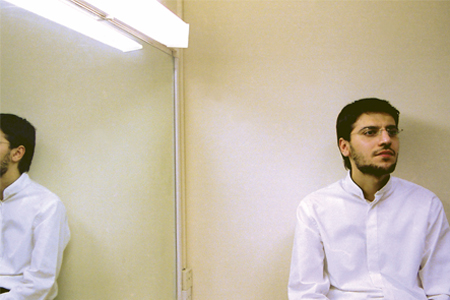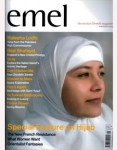
Play it again, Sami..
Issue 4 Mar / Apr 2004
Sami Yusuf and his debut album Al Mu’allim exploded onto the nasheed scene at last July’s Raihan concert in London, renewing an area of British Muslim life that had been a cultural backwater with few dedicated patrons for far too long.
Sami Yusuf, 23, is of Azeri origin, and still speaks Azeri at home. “My Azeri is not perfect,” he states, but his talent for languages - “I speak English and Farsi and am planning to advance my Arabic and Islamic studies by going to Egypt for a year in September” - is suggestive of his gift for the spoken word.
The youngest in the family, he lives at home with his parents, brother and sister, and divides his time between full-time study and work. Sami defines his identity as a Muslim and has always been a spiritual person, describing himself as “intuitive, curious and always in awe and admiration of the wonders and creation of God. I would be moved by the sunset or by a beautiful scenery.” His journey towards Islam evolved as he entered his formative years. “I didn’t go out of my way to find out about Islam when I was young and would casually accept the misconceptions being spread by the media. From my early teens I began to raise many questions that other Muslims seemed unable to answer. I considered myself culturally a Muslim, but I was growing increasingly uncomfortable that I did not practice.”
His journey towards faith occurred over the expanse of a few years. “When I was 15 years old, the family of Shaykh Rached al-Ghannouchi moved into our neighbourhood, and their son, Bara, joined my school. Bara and I would walk together to school every morning and spend many evenings in my house, discussing religion, politics and history. I went through a patchy period where I would pray for a few days then stop, then start again. Bara and his family were very sensitive and did not try to force me to do anything.
This ‘patchy’ period continued for a while, until towards the end of the last decade Sami “began to pray five times a day as opposed to just praying when I felt like it.” However, the turning point in his journey through life came when he decided to attend the Tajdid course in the summer of 2002, organised by the Islamic Institute of Da’wa and Research (IIDR). “That course made my commitment to Islam firm. It was like a dream for me; I lived for a whole month amongst people I had never met before, but the spirit of love and brotherhood that existed there could not be found in any family.
Sami cites a number of scholars as his inspiration, including Shaykh Yusuf al-Qaradawi, Shaykh Rached al-Ghannouchi and Dr Aziz Sheikh. “Every day I took lessons in Hanafi Fiqh with Shaykh Talha Bukhari, Arabic lessons with Dr Muhammad Mustafa - who I consider the best Arabic teacher in the world - and with Hasan al- Banna, Tajwid lessons with Ustadh Jamil Rahman and Shaykh Hafidh. Visiting lecturers would arrive every evening to speak on a variety of issues such as ‘Aqeeda, Islamic History, Revival and Revivers, Spirituality, Women’s Scholarship in Islam, Islam and Health. It was a truly enlightening and definitely a life-changing experience for me.”
Sami’s renewed interest in faith led to his involvement in nasheed music. He considers nasheeds as an important medium that serve a dual purpose. First and foremost to promote the message of Islam, and secondly to encourage youth to take pride in their faith – not least by diverting their attention away from modern pop culture. “Combined with what I had learned and experienced at the Tajdid 2002 course, there was a constant message from the scholars that we should not seek knowledge to benefit ourselves only, but to benefit our community and society at large. God blessed me with the skills to become a tool for leading others to Him. That is and will always be my goal in whatever I do.”
Al-Mu’allim blends traditional ideas, thoughts and prayers with contemporary melodies that appeal to contemporary tastes. An interesting quality of the tracks is their ability to attract the attention of different cultures (Allahu is proving to be especially popular with sub-continental communities). The result is melodies and composition working in harmony with the lyrics to ignite and protect the spark of pride that is always the first step towards understanding, exploring and propagating the faith.
Many of his fans would like him to perform more frequently, however Sami prefers not to perpetuate his fame. “I work full-time as well as being a full-time student, so I am extremely busy, and cannot perform as much as people would like. I am also not a person who craves the spotlight or seeks fame. This is how I have been brought up by my parents. I try to limit my performances due to these reasons, and I ask people who are disappointed to forgive me.”
Sami is clear in his motivation, “It is an obligation for Muslims to persevere and become the best at whatever they're doing. There is no room for mediocrity in Islam, and we must strive for perfection in all spheres of our lives.”
Bookmark this |
|
Add to DIGG |
|
Add to del.icio.us |
|
Stumble this |
|
Share on Facebook |
|
Share this |
|
Send to a Friend |
|
Link to this |
|
Printer Friendly |
|
Print in plain text |
|


Comments
1 Comment
1
Danial Qasim
2 Aug 11, 20:07
i am a huge fan of him, and i would like to be spiritual like him. May Allah Bless him.